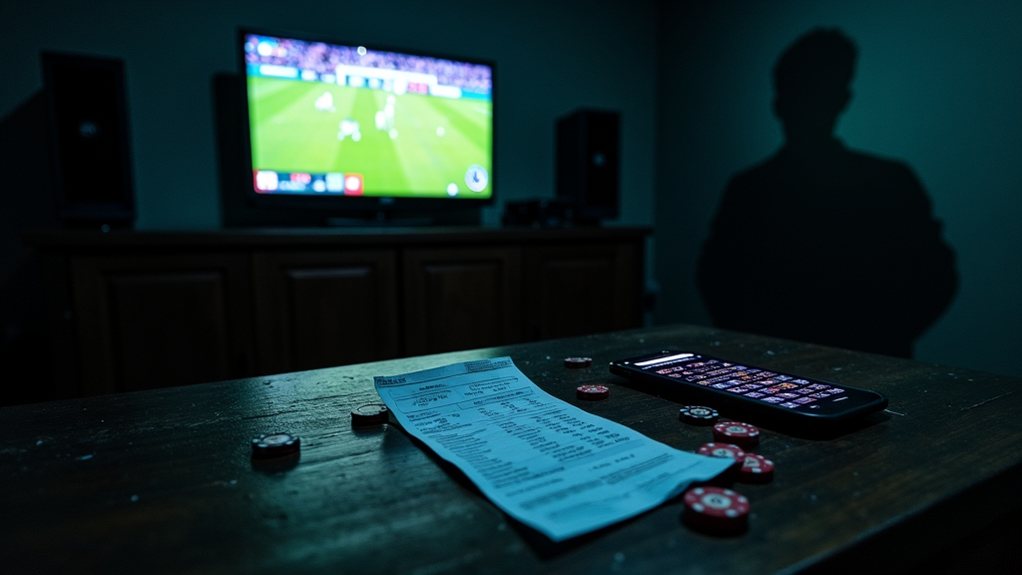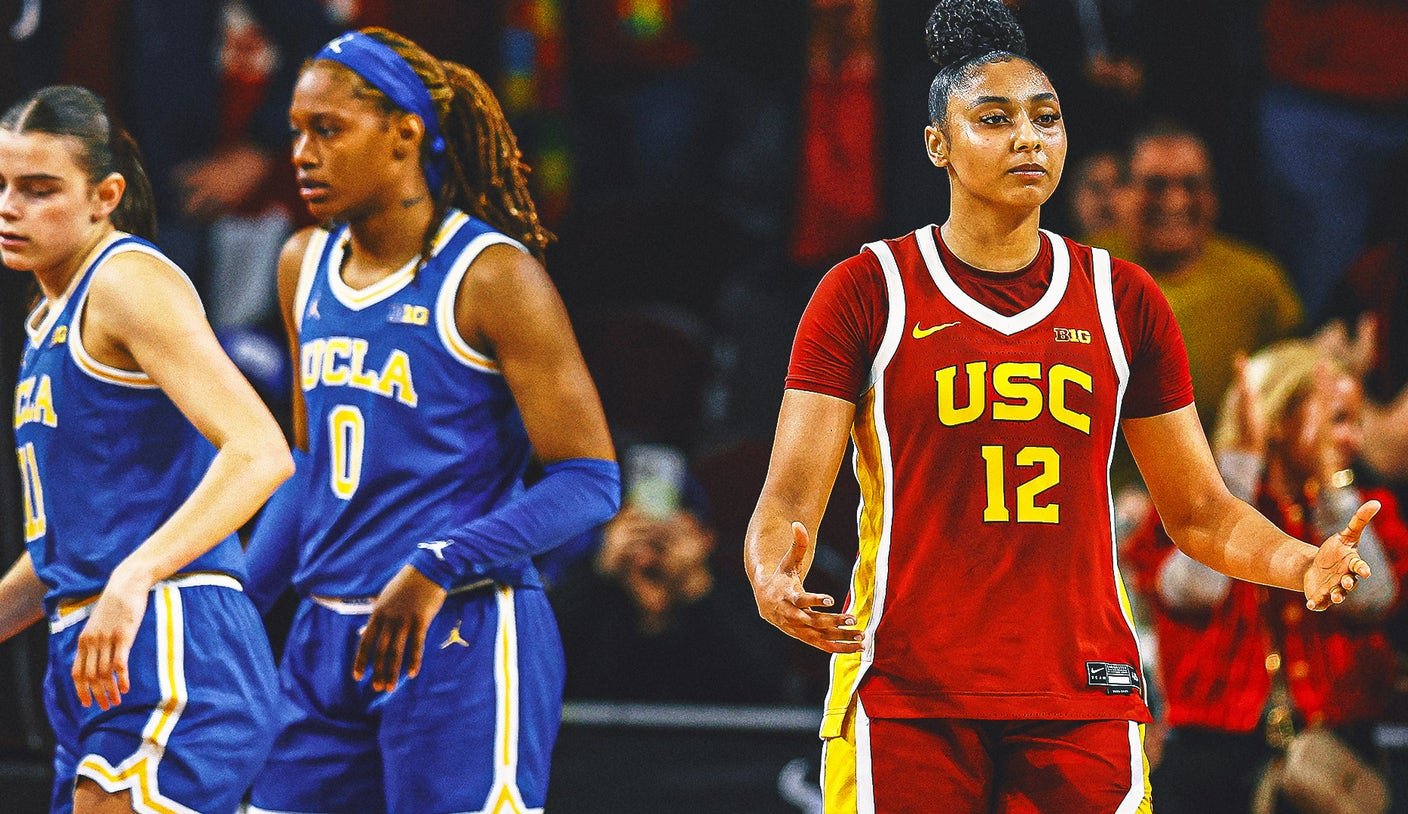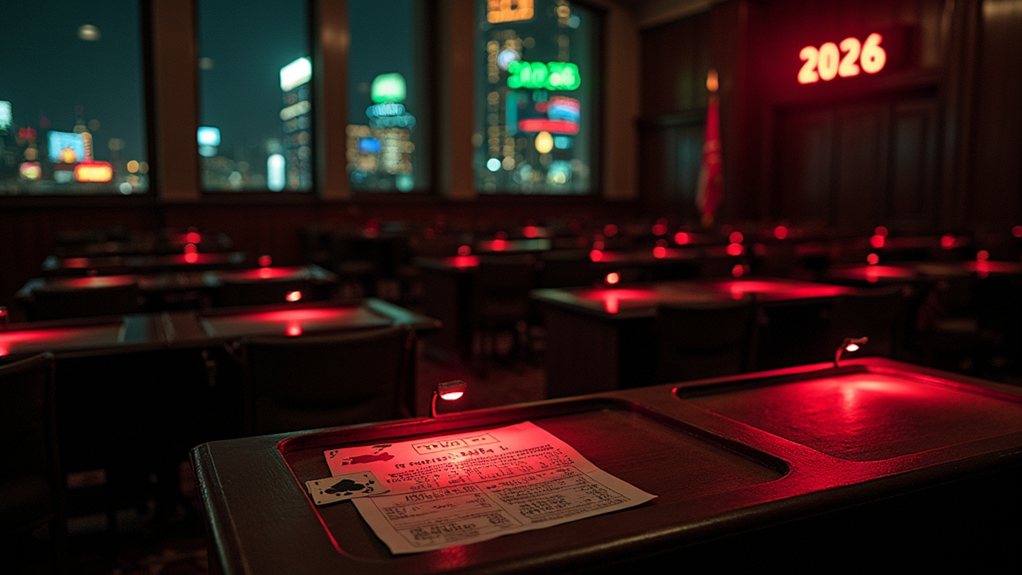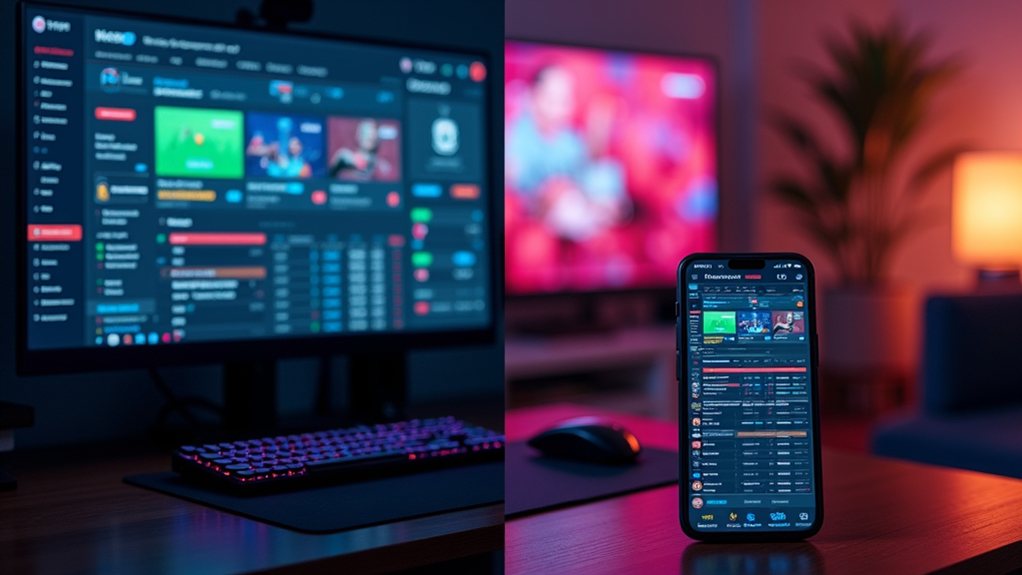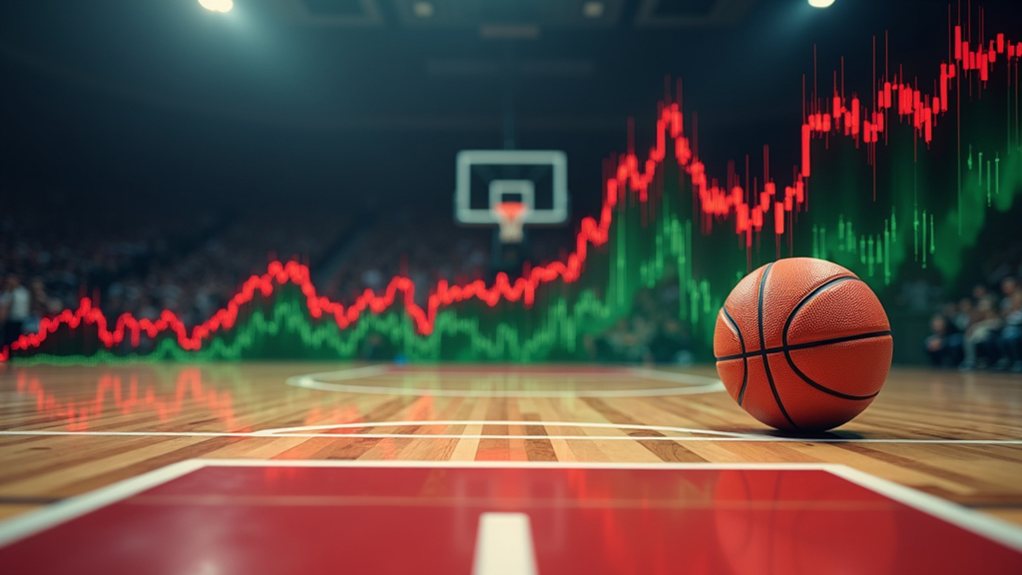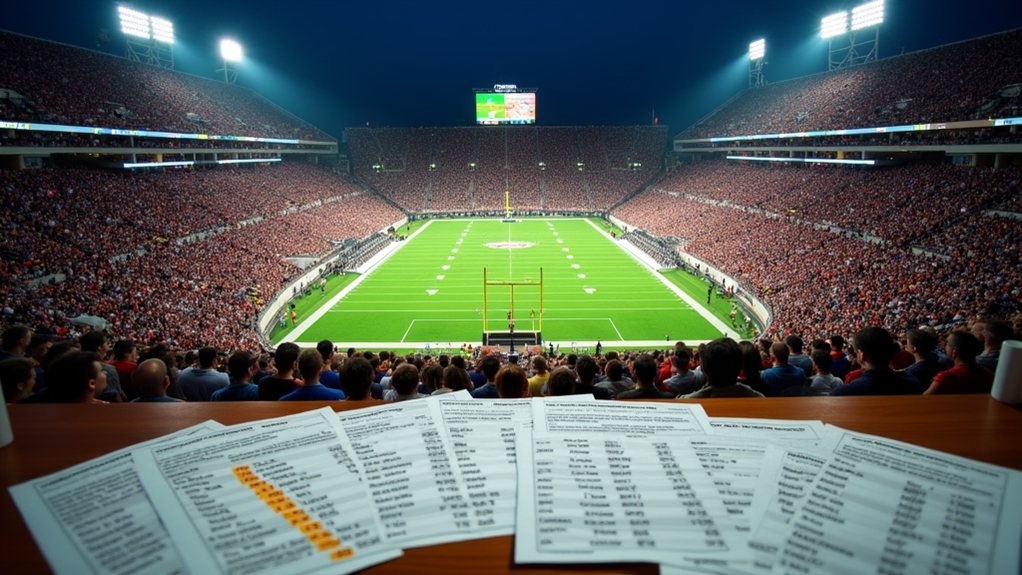Sports betting scandals have rocked the foundations of professional athletics for decades. The industry’s dark underbelly reveals itself through high-profile cases like the Black Sox Scandal and Tim Donaghy’s betrayal of NBA trust. These five conspiracies represent moments when gambling interests compromised competitive integrity. Our experts have spent years analyzing these patterns to protect bettors from similar situations. The evolution of betting markets continues to present new challenges, as seen in the Porter case. Don’t miss what these scandals teach about today’s wagering landscape.
The Black Sox Scandal: Baseball’s Darkest Hour
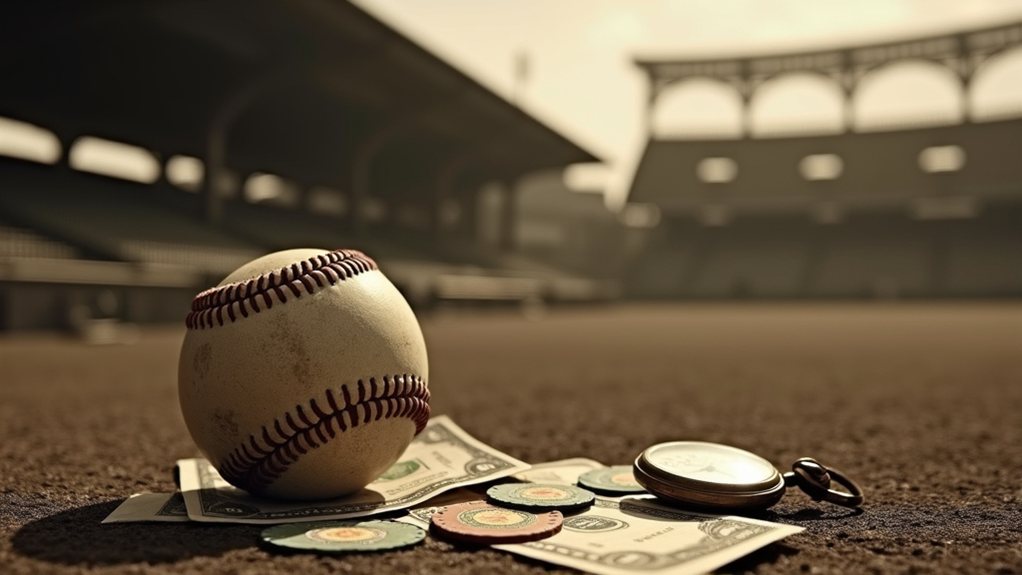
Eight Chicago White Sox players changed baseball forever when they agreed to throw the 1919 World Series in exchange for payments from gambling syndicates.
Led by pitcher Eddie Cicotte and star “Shoeless” Joe Jackson, the conspiracy rocked America’s pastime to its core.
The Black Sox scandal shook baseball’s foundation when Cicotte, Jackson and teammates betrayed America’s game for illicit gambling payoffs.
Despite being acquitted in court, Commissioner Landis banned all eight players for life, establishing a zero-tolerance standard that remains the gold standard in sports integrity.
The scandal prompted baseball to institute the commissioner system to protect the game from gambling influences.
This watershed moment continues to serve as a cautionary tale about the dangers of match-fixing in professional sports.
Team owner Charles Comiskey’s reputation for financial miserliness contributed significantly to the players’ willingness to accept bribes, as many felt underpaid despite the White Sox having the largest payroll in the league.
The Cincinnati Reds ultimately won the controversial series, bringing to light the serious threats gambling posed to sports integrity.
Tim Donaghy: The NBA Referee Who Broke Trust
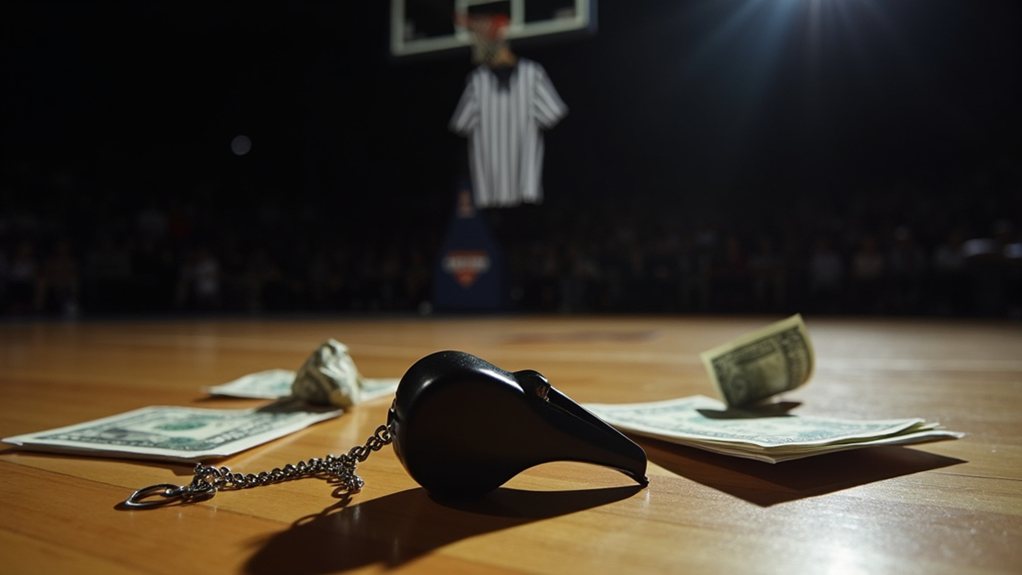
While baseball’s darkest hour came early in the 20th century, basketball faced its own integrity crisis nearly nine decades later. Tim Donaghy, an NBA referee, betrayed the sport’s trust by betting on games he officiated from 2003-2007. Using insider knowledge about players and officials, Donaghy achieved a remarkable 75% win rate on his bets. Donaghy eventually surrendered to authorities and pleaded guilty to two felony conspiracy charges in 2007. His actions represent one of the most infamous examples of point shaving in professional sports, though uniquely from an official rather than players themselves. Professional handicappers like Anthony Best often emphasize the importance of bankroll management when discussing gambling scandals and their aftermath.
| Donaghy Scandal Facts | Impact |
|---|---|
| Betting Timeframe | 2003-2007 seasons |
| Win Rate | Approximately 75% |
| Detection Method | FBI investigation |
| NBA Response | Extensive reforms |
The scandal prompted the NBA to implement extensive officiating reforms. Despite official claims it was isolated, Donaghy’s actions damaged public trust in professional basketball’s fairness.
Jontay Porter’s Micro-Betting Manipulation
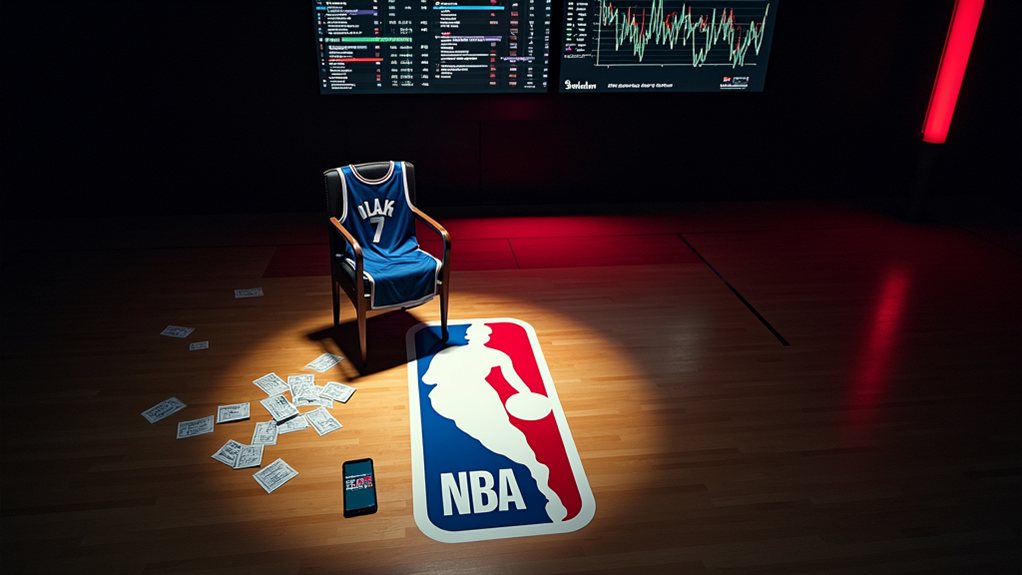
In a shocking case that emerged during the 2023-2024 NBA season, Toronto Raptors player Jontay Porter became the focal point of a serious micro-betting manipulation investigation.
The NBA uncovered suspicious betting patterns on Porter’s prop bet “unders” during January and March games, including an $80,000 parlay bet placed after Porter allegedly disclosed health information.
Suspiciously timed $80,000 parlay on Porter’s under props followed his alleged leaking of personal health details to gamblers.
- Large bets exceeding typical $1,000-$2,000 limits raised immediate red flags
- Porter exited a game early due to illness, directly benefiting under-bettors
- NBA’s integrity monitoring systems flagged unusual betting activity on Porter’s props
Potential consequences included lifetime ban, fines, and contract termination.
This case highlights why organizations now promote setting limits as a critical responsible gambling behavior to prevent problematic betting patterns.
The Porter scandal demonstrates how crucial bankroll management is for maintaining betting integrity and preventing suspicious patterns that could trigger investigations.
Hidden Influences: Match-Fixing in College Basketball
College basketball’s dark underbelly has recently been exposed through a series of match-fixing scandals that threaten the integrity of the sport.
Programs like Eastern Michigan, North Carolina A&T, and Mississippi Valley State have come under federal investigation for suspicious betting patterns.
Organized crime rings target vulnerable programs, creating schemes that generate millions in illicit profits.
Research suggests up to 6% of strong favorites may engage in point shaving, with corruption potentially affecting 1% of all games.
Large point spreads create economic incentives for manipulation.
The NCAA has responded by partnering with monitoring services to protect competition integrity, though the number of implicated schools continues to grow.
The Digital Shadow: Black Market Betting Operations
Countless unregulated betting operations lurk in the digital shadows, presenting a growing threat to sports integrity worldwide.
These black market platforms utilize cryptocurrencies like Bitcoin and Monero to maintain anonymity while offering attractive odds that legitimate bookmakers can’t match.
Our industry experts with gold-standard experience have identified key risks that every bettor should know.
- Financial transactions are irreversible, with no recourse if operators withhold winnings
- No protections exist against problem gambling behaviors
- Personal data remains vulnerable to security breaches
- Games may be rigged, greatly increasing fraud risk
Unlike regulated sportsbooks that maintain capital reserves to cover payouts, black market operations often lack financial stability.
Don’t miss out on licensed alternatives—your security depends on it!
FAQs
How Do Bookmakers Detect Unusual Betting Patterns?
Bookmakers detect unusual patterns through behavioral analysis, algorithms, odds movement monitoring, bet timing analysis, and real-time surveillance systems that flag suspicious activities and transaction anomalies requiring further investigation.
Can Athletes Bet on Their Own Sports Legally?
Athletes are generally prohibited from betting on their own sports through league regulations and state laws, though specific restrictions vary by jurisdiction, sport, and level of competition.
What Penalties Do Leagues Impose for Match-Fixing?
Like a guillotine poised to drop, leagues impose severe penalties for match-fixing: suspensions, contract terminations, hefty fines, lifetime bans, and even potential expulsion, allowing no quarter for those betraying the game.
How Has Technology Changed Sports Betting Conspiracy Detection?
Technology has transformed conspiracy detection in sports betting through AI algorithms, machine learning models, and real-time monitoring systems that identify suspicious patterns with over 92% accuracy, enhancing transparency and integrity.
Are Family Members of Players Restricted From Sports Betting?
Like birds of different feathers, family members face varying restrictions. Most leagues don’t directly limit relatives’ betting, but sharing insider information remains prohibited and can trigger sanctions if betting involves their relative’s games.
